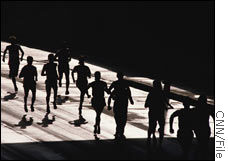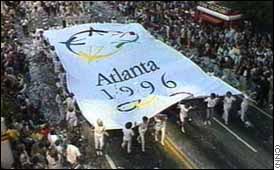
NEW YORK (CNN/Money) -
With all the problems facing the U.S. Olympic Committee, the ethical lapses that led to CEO Lloyd Ward's recent resignation would have trouble competing for the bronze medal.
Ward, the former Maytag CEO, was forced to quit following the revelation that he tried to use his position to get his brother a contract to provide equipment for the Pan Am games. But his departure would only be the first of a massive shakeup of the staff and structure of the organization if its many critics, including several members of Congress, get their way.
The USOC has become a monument to bureaucracy and bloated overhead that has eaten up much of the money that should be going to the athletes. Its 123-member board of directors makes the United Nations seem like a streamlined body that reaches consensus easily.
 |
|
| Critics say USOC policies are depriving U.S. athletes the support they need to compete. |
Members of the board include not only the 39 different Olympic sports' governing bodies but also groups from Boys & Girls Club of America to the governing bodies for rugby, bowling, and water skiing, even though those are not Olympic sports.
Even the USOC's executive committee has 21 members. Special assistants, advisers and others bring minimum attendance at the meetings to more than 50 people, according to Marty Mankamyer, who recently resigned as the president of the body.
"It is so clearly an organization with all different groups that have a vested interest in getting things done their way," said one sports executive who has dealt with the USOC for a number of years, who spoke on condition her name not be used. "It's not a board designed to act in a business-like manner for the good of the overall organization. You can't put everyone who has an interest in getting their own funding on board and expect it to have any other outcome."
The USOC has more than three times the staff of the International Olympic Committee (IOC). Many of the employees work at USOC training facilities that critics charge are a waste of limited resources.
"While the USOC will claim that its training facilities are vital, a great many Olympians and aspiring Olympians don't use them and train instead at other sites," David D'Alessandro, CEO of John Hancock Financial, said in recent testimony to the Senate Commerce Committee. "Most athletes would agree this is an ineffective use of a major part of the USOC's budget."
| SportsBiz
|

|
| Click here for SI.com sports coverage
|
|
|
|
D'Alessandro is a vocal USOC critic, despite, or perhaps because of, his company's position as a top Olympics sponsor. He says too much is spent on overhead and not nearly enough goes to athletes, and that the body does not release as much detail about its spending as it is required under various laws and regulations.
The USOC's budget for the 2001 to 2004 period projects payments of $177 million going to support athletes either directly or through their sports' governing bodies. That equals slightly more than one dollar out of every three of its nearly $500 million budget for the period. And even the payments that go to the governing bodies have been questioned.
D'Alessandro, who said that he wants to see 85 percent of USOC spending go to athletes, said that in 2001 $2.6 million of USOC support went to gymnastics and figure skating, popular sports where competitors are generally still amateurs, at least until they achieve some Olympic success. Meanwhile $3.1 million went to hockey and basketball.
"The NHL and NBA pros who populate the Olympic teams in these sports hardly need the subsidy," he said. "Why aren't the NHL and NBA not paying the USOC for marketing their properties worldwide?"
Besides questions about how the money is spent, there are also doubts about where new funds will come from. Some of the sponsor and television dollars that support the group are clearly at risk.
The IOC, facing demand from many poorer nation's Olympic committees, may not give as great a share of sponsorship and television dollars to the USOC as in the past. Especially with the current scandal, counting on the same level of IOC support is questionable.
| Related columns
|

|
|
|
|
In addition, USOC's own sponsorship efforts could be hurt by the scandal. One former top executive of the USOC told me he doubted the major sponsors would pull out, but that smaller sponsors could pull back, as could charitable giving by individuals and foundations.
"Coca-Cola isn't going to pull out and let Pepsi step in," he said. "But when you reach the secondary level, more national in orientation, they may think differently. As for the charitable giving, we saw what happened with United Way when it had its scandal."
The chance of New York landing the 2012 Olympics may have been hurt by both the Ward controversy and committee infighting, as well as European opposition to U.S. policy in the Iraq and the Middle East.
 |
|
| The USOC has helped win two Olympic games here in the last decade, but New York's chances for the 2012 games could be hurt by current problems. |
While the executive who spoke to me said he hoped any fallout from a possible war would have faded in two years when the decision is made, another executive who has been involved in the selection process believes the war and the upheaval at the USOC have together killed New York's chances for 2012.
"The sponsors are much more interested in coming on when there's a domestic games in the offing," said that executive. "With that looking like a further and further off, it's one more thing that's killing them at this time."
D'Alessandro isn't pulling the plug on John Hancock's sponsorship. But he believes the USOC isn't living up to its fund-raising potential due to its problems, and said this was costing aspiring athletes as well as the nation's chances of success at the Olympics.
"In 2001, $6.4 billion was spent on sports sponsorships in North America," he said. "We don't need to depend on the largesse of the IOC to support our athletes. We don't need public subsidies or lotteries for the USOC. We need a USOC competent enough to compete for those billions of sponsorship dollars with the likes of Major League Baseball and the NFL."

|

